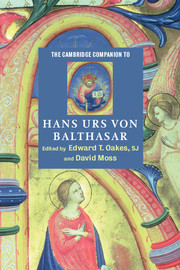Book contents
- Frontmatter
- 1 Introduction
- Part I Theological topics
- 2 Revelation
- 3 Christology
- 4 Balthasar and the Trinity
- 5 For the life of the world: Hans Urs von Balthasar on the Church as Eucharist
- 6 Balthasar and the figure of Mary
- 7 The saints
- 8 One sex or two? Balthasar’s theology of the sexes
- 9 Eschatology
- Part II The trilogy
- Part III Disciplines
- Part IV Contemporary encounters
- Select bibliography
- Index
9 - Eschatology
from Part I - Theological topics
Published online by Cambridge University Press: 28 May 2006
- Frontmatter
- 1 Introduction
- Part I Theological topics
- 2 Revelation
- 3 Christology
- 4 Balthasar and the Trinity
- 5 For the life of the world: Hans Urs von Balthasar on the Church as Eucharist
- 6 Balthasar and the figure of Mary
- 7 The saints
- 8 One sex or two? Balthasar’s theology of the sexes
- 9 Eschatology
- Part II The trilogy
- Part III Disciplines
- Part IV Contemporary encounters
- Select bibliography
- Index
Summary
The red thread of eschatology - thought and doctrine about ultimates - runs through Hans Urs von Balthasar's work from start to finish. He first took up this theme with his humanistic dissertation written at the University of Zurich on 'the history of the eschatological problem in modern German literature' (1930), a large study that was eventually incorporated into an even larger enterprise, a three-volume work on 'the apocalypse of the German soul' (1937-39). And in what may have been his last academic engagement before his death, Balthasar in April 1988 gave a lecture at the University of Trier on apokatastasis (the technical Greek term referring to 'the restoration of all things at the end of time'). But more than the sheer pervasiveness of the topic, his own version of eschatology has also been probably the most innovative - and therefore most controversial - theme in his theology. That was the case at least from the time when he published Mysterium Paschale in 1969, and he continued to radicalize his position in the last two decades of his life in the explicitly eschatological sections of the Theo-Drama and the Theo-Logic.
ESCHATOLOGY AS REVELATION
The thesis of Balthasar’s earliest work, both the dissertation and its later three-volume expansion, was that the ways in which a people envisions the End ‘reveal’ its ‘soul’.
- Type
- Chapter
- Information
- The Cambridge Companion to Hans Urs von Balthasar , pp. 113 - 128Publisher: Cambridge University PressPrint publication year: 2004

